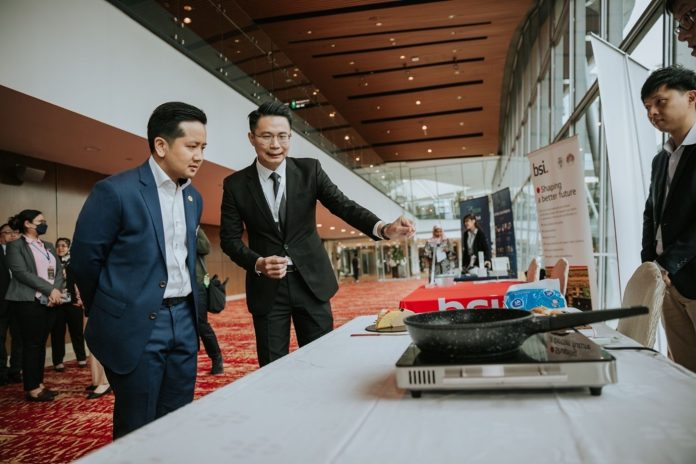
A local firm joins global race to produce cultivated meat in Penang in a RM20 million facility
A LOCAL COMPANY has set its target to produce cultivated meat in Malaysia by 2025. Efforts are on the way to build a RM20 million facility in Penang by Cell AgriTech Sdn Bhd, a Bio-Based Accelerator (BBA) company next year.
Founder and Manufacturing Vice President of Cell AgriTech Group of Companies, Jason Ng is confident that if policies are in place, Malaysians will be able to savour locally cultivated meat by mid-2025.
To achieve this, the company jointly organised Malaysia’s First Cultivated Meat Conference at the Kuala Lumpur Convention Centre in March with the Malaysian Bioeconomy Development Corporation.
The conference which brought local and international players and experts together was officiated by Deputy Minister of Science, Technology and Innovation (MOSTI), Datuk Arthur Joseph Kurup. The conference on cultivated meat is the first of its kind to be held in Malaysia. It aimed at brainstorming policies, enablers and gaps that need to be addressed to take this futuristic technology to the market.
Cultivated meat or cellular agriculture is meat produced from biotechnology that involves growing animal tissue cells in a controlled laboratory setting, instead of relying on conventional animal farming methods of raising and slaughtering farm animals.
The outcome is an exact replica of real meat that potentially offers similar taste, texture, and nutritional value as conventionally farmed meat – minus the environmental footprints caused by methane emissions, and waste from the farms. It also offers guilt-free meat and eliminates the concerns of animal welfare in farms.
“Research and Markets estimate that the cultivated meat market, valued at RM791.87 million (USD176.48 million) in 2022, will increase to RM1.443 billion (USD321.71 million) in 2027, with a CAGR of 12.76%. The development of cultivated meat technology in Malaysia promises to create job opportunities and revenue while addressing national challenges such as food security, health management, and climate change,” said Kurup.
He added that MOSTI, through Bioeconomy Corporation, will support efforts like cultivated meat to strengthen the nation’s food security. Cultivated meat is a vital part of Malaysia’s National Biotechnology Policy 2.0, specifically under Flagship Project 2, which aims to develop a food ecosystem for future high-value products using advanced technologies such as cellular agriculture for artificial meat, marine, and aquaculture products.
Bioeconomy Corporation’s Chief Executive Officer, Mohd Khairul Fidzal Abdul Razak said, “As the global population surpassed 8 billion in November 2022 and with limited resources to produce enough food for everyone sustainably, the cultivated meat industry is poised to grow substantially. According to a recent study by the Good Food Institute, the alternative protein industry has attracted RM63.7 billion (USD14.2 billion) in global investments during the last ten years and these investments have doubled year over year”.
Recognising the massive potential of this industry, Bioeconomy Corporation is committed to collaborating with companies such as Cell AgriTech, MOSTI, other ministries, and regulatory bodies to develop policies, regulations, and frameworks that will benefit the entire future food industry.
Cell AgriTech is teaming up with UmamiMeats, a company that develops the cell lines for Grouper, Japanese Eel, and Snapper and optimises the scaling-up process. To support talent development in this field, Cell AgriTech is partnering with Universiti Sains Malaysia (USM) to introduce a professional certification programme in cultivated meat, covering fundamental concepts to industrial applications. With the curriculum now finalised, interested individuals can apply for the course starting May 2023.
“To bring down the cost of production, we need more players in this sector. Cell AgriTech is happy to bring this innovative and sustainable solution to the meat industry and see other companies joining the league”, said Ng.
The two-day event featured round table meetings, demo sessions, keynote presentations, a networking dinner and a mini-exhibition, which succeeded to facilitate knowledge sharing and collaboration among 130 local and international stakeholders, as well as generate discussions and insights on the latest developments and opportunities in cultivated meat and its potential impact on the food industry and environment.
Delegates included regulators and policymakers from government agencies, religious authorities, food manufacturers, investors, universities, researchers, industry associations and science communicators. They discussed cultivated food regulations and testing, cost drivers of cultivated meat, food regulation and safety in Malaysia, halal studies, and standards that would propel this industry.
One of the primary cost drivers for cultivated meat is cell culture media. Thus, Dr Maanasa Ravikumar, Science and Technology Specialist, from Good Food Institute, Asia Pacific, suggested few approaches to reduce the cost which are formulating serum free media and adapt or engineer cell lines for reduced growth factor requirements.
“Few safety considerations that revolves around cultivated meat are if the cell-line of the donor animal is healthy, toxicity of media components, risk management during the manufacturing process and the safety of the supply chain once the end product is ready for commercialisation,” pointed out, Colin Lim, Deputy Director of Future Ready Food Safety Hub (FRESH).
South Korea and Singapore are currently leading the race in this sector with the most number of start-ups and the first approved meat in the market respectively.
Article originally published in: https://thepetridish.my/2023/03/28/cultivated-meat-for-msian-consumers-in-2025/